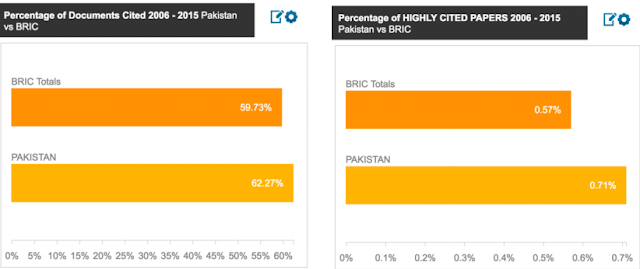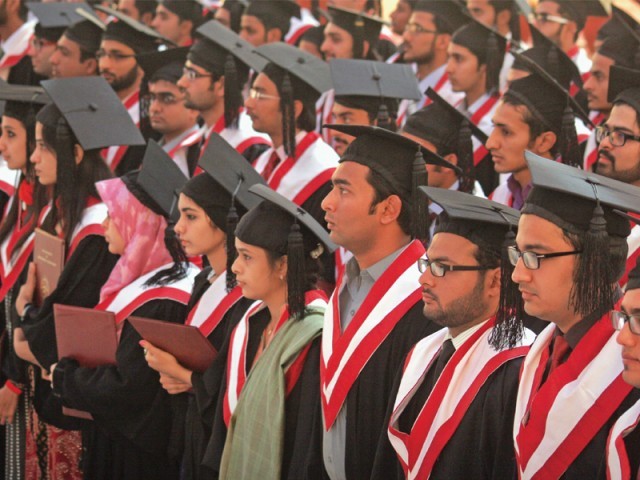PakAlumni Worldwide: The Global Social Network
The Global Social Network
Pakistan Beats BRICs in Percentage of Highly Cited Research Papers
Pakistan has emerged as the country with the highest percentage of Highly Cited Papers compared with the BRIC countries (Brazil, Russia, India and China) in the last 10 years, according to Thomson Reuters. Pakistan has doe so despite the fact that its "R&D environment faced substantial economic challenges".
In a report titled "Pakistan: Another BRIC in the Wall", author Lulian Herciu says that Pakistan’s scientific productivity has quadrupled, from approximately 2,000 articles per year in 2006 to more than 9,000 articles in 2015. During this time, the number of Highly Cited Papers featuring Pakistan-based authors increased tenfold, from 9 articles in 2006 to 98 in 2015.
The author asserts that his report provides comparisons between Pakistan and BRIC nations taking a look at productivity and leveraging contextual indicators. His analysis points to the fact that Pakistan can be benchmarked with emerging and dynamic countries such as those in the BRIC (Brazil, Russia, India and China) group.
The Thomson Reuters report has found that, in 2012, "Pakistan's normalized Citation Impact was higher than that of all of the BRIC nations".
CERN Membership:
In 2014, Pakistan became the first Asian country and only the third in the world after Turkey and Serbia to be honored with CERN's associate membership. The status of associate member is a step before full membership. As an associate member, Pakistan is entitled to attend open and restricted sessions of the organization.
College and University Enrollment:
There are over 3 million students enrolled in grades 13 through 16 in Pakistan's 1,086 degree colleges and 161 universities, according to Pakistan Higher Education Commission report for 2013-14. The 3 million enrollment is 15% of the 20 million Pakistanis in the eligible age group of 18-24 years. In addition, there are over 255,000 Pakistanis enrolled in vocational training schools, according to Technical Education and Vocational Training Authority (TEVTA).
Graduation Day at NED Engineering University For 1300 Graduates in 2013 |
Pakistani universities have been producing over half a million graduates, including over 10,000 IT graduates, every year since 2010, according to HEC data. The number of university graduates in Pakistan increased from 380,773 in 2005-6 to 493,993 in 2008-09. This figure is growing with rising enrollment and contributing to Pakistan's growing human capital.
Higher education in Pakistan has come a long way since its independence in 1947 when there was only one university, the University of Punjab. By 1997, the number of universities had risen to 35, of which 3 were federally administered and 22 were under the provincial governments, with a combined enrollment of 71,819 students. A big spending boost by President Pervez Musharraf helped establish 51 new universities and awarding institutions during 2002-2008. This helped triple university enrollment from 135,000 in 2003 to about 400,000 in 2008, according to Dr. Ata ur Rehman who led the charge for expanding higher education during Musharraf years. There are 161 universities with 1.5 million students enrolled in Pakistan as of 2014.
R&D Investment:
Rise of research and publications at Pakistani universities began during Musharraf years when the annual budget for higher education increased from only Rs 500 million in 2000 to Rs 28 billion in 2008, to lay the foundations of the development of a strong knowledge economy, according to former education minister Dr. Ata ur Rehman. Student enrollment in universities increased from 270,000 to 900,000 and the number of universities and degree awarding institutions increased from 57 in 2000 to 137 by 2008. Government R&D spending jumped seven-fold as percentage of GDP from 0.1% of GDP in 1999 to 0.7% of GDP in 2007. It has since declined as percentage of GDP.
Summary:
Pakistani scientists and researchers are continuing to produced highly cited research in spite of serious economic and security challenges. Enrollment in higher education is rising and giving a boost to academic research. With better policy focus and more investment in higher education, Pakistan can make an even greater impact with its young demographics.
Related Links:
Rising College Enrollment in Pakistan
10 Pakistani Universities Among Asia's Top 300
Genomics and Biotech Research in Pakistan
Human Capital Growth in Pakistan
Educational Attainment in Pakistan
Pakistan Human Development in Musharraf Years
-
Comment by Riaz Haq on September 19, 2016 at 8:41am
-
Interestingly, the report maintains that “although from productivity perspective the comparison shows a huge difference, using contextual indicators we will see that Pakistan can be benchmarked with emerging and dynamic countries as those of the BRIC group.”
‘Pakistan needs to set up more research institutes’
Pak vs BRIC
The report denotes that in 2012, in the category normalised citation impact (CNCI), Pakistan was higher than all BRIC countries besides, the percentages of documents cited and the percentage of highly cited papers are also greater.
As per data, the total percentage of documents by all the BRIC countries cited during 2006-2015 is 59.73 per cent while it was 62.27 per cent for Pakistan alone. Similarly, percentage of BRIC’s highly cited papers during the same period was 0.57 per cent while it was 0.71 per cent in Pakistan’s case.
Subject area
When compared with six major fields of sciences, Pakistan has the best CNCI in engineering and technology, showing focus on applied research. The data on natural sciences shows a steady increase while medical and health sciences have witnessed large fluctuations.
The humanities group has witnessed a steep slope in 2015 after soaring way higher in 2014. The group of agricultural sciences has hit a rock-bottom in 2015 compared to BRIC countries.
Natural sciences documents have been cited 34,538 times followed by medical and health sciences with 15,973 times while humanities with the lowest citations.
Six Pakistani universities among world’s top 700 institutes
Report findings opposed
Educationist and physicist Pervez Hoodbhoy refused to buy the claims of the report, saying the results of the report were counter-intuitive and flatly contradict with what one daily observed and experiences inside any Pakistani university.
Another Pakistani theoretical physicist with a doctorate from the Massachusetts Institute of Technology, Amer Iqbal, also criticised the findings of the report, stating that “highly cited is not always the same as highly influential”.
http://tribune.com.pk/story/1183999/notch-pakistani-articles-cited-...
-
Comment by Riaz Haq on September 24, 2016 at 4:45pm
-
#Pakistan's Wonder Boys Reimagine Special #Education Get Global Innovation Award at #Stanford via @forbes #specialed http://www.forbes.com/sites/sonyarehman/2016/09/24/meet-pakistans-w...Taking home third prize at the Global Innovation through Science and Technology (GIST) Tech-I Startup Competition held at Stanford University this year, WonderTree, a Pakistani start-up from Karachi, is on the road to aiding children with special needs by way of its thoroughly interactive augmented reality games.For Muhammad Usman, the start-up’s co-founder and Chief Technical Officer, the birth of WonderTree swiftly took shape in 2015, when he saw his older brother (born with special needs) enjoying playing a game on his PlayStation. “It was then when all the dots connected and I realized what I wanted to do,” Usman stated.Working closely with special education teachers, occupational therapists and psychologists, the start-up has currently developed four games that are best suited for children with autism, down syndrome, cerebral palsy, ADHD, and other mental disabilities.With just a kinect v2 sensor, a television and a laptop as the only hardware required to play the games, WonderTree’s technology assists in developing motor, cognitive and functional skills for children with learning disabilities. But that’s not all; the start-up’s games feature an in-built reporting system which helps the developers track and document each child’s performance.“We’re working on ways of using this data to build AI (artificial intelligence) into our games,” Usman said, speaking of WonderTree’s upcoming plans, “So in the future; our games will be able to adjust the difficulty levels and other settings as per the child’s needs, progress and disability. This will make our games highly efficient. We’re really excited about this.”
Comment
Twitter Feed
Live Traffic Feed
Sponsored Links
South Asia Investor Review
Investor Information Blog
Haq's Musings
Riaz Haq's Current Affairs Blog
Please Bookmark This Page!
Blog Posts
India-Pakistan Cricket Match: The Biggest Single Event in the World of Sports
Why did Pakistan's decision to boycott the India-Pakistan match in solidarity with Bangladesh in this year's T20 World Cup send shockwaves around the world? And why did it trigger the International Cricket Council's and other cricket boards' urgent efforts to persuade Pakistan to return to the match? The reason has a lot to do with its massive financial impact, estimated to be as much as …
ContinuePosted by Riaz Haq on February 11, 2026 at 4:00pm — 2 Comments
Can Pakistan's JF-17 Become Developing World's Most Widely Deployed Fighter Jet?
Worldwide demand for the JF-17 fighter jet, jointly developed by Pakistan Aeronautical Complex (PAC) and China’s Chengdu Aircraft Industry Group (CAIG), is surging. It is attracting buyers in Africa, Asia and the Middle East. At just $40 million a piece, it is a combat-proven flying machine with no western political strings attached. It has enormous potential as the lowest-cost 4.5…
ContinuePosted by Riaz Haq on February 4, 2026 at 8:00pm — 2 Comments
© 2026 Created by Riaz Haq.
Powered by
![]()




You need to be a member of PakAlumni Worldwide: The Global Social Network to add comments!
Join PakAlumni Worldwide: The Global Social Network